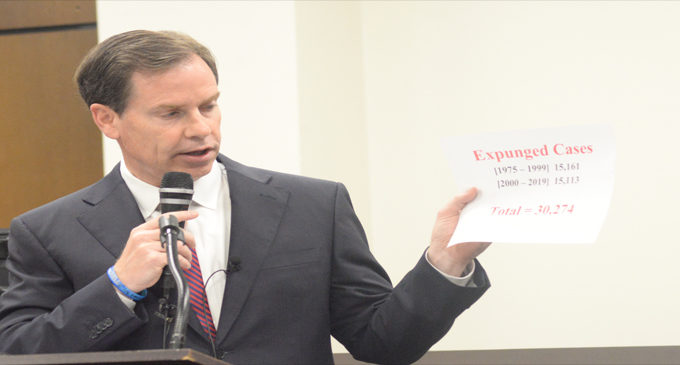Forsyth County DA announces plan to expunge records of more than 30,000
Forsyth County District Attorney Jim O’Neal.

The Forsyth County District Attorney’s Office has announced their plan to expunge the records of more than 30,000 people for minor offenses they committed when they were teens. During a press conference last week, District Attorney Jim O’Neil said the Second Chance Act, which is also known as the “clean slate” bill, will level the playing field for people throughout Forsyth County.
On Dec. 1, 2019, the Juvenile Justice Reinvestment Act or the “Raise the Age Act” was made law across North Carolina. Prior to Raise the Age, 16 and 17 year olds were tried as adults; now those cases are heard in juvenile court. With the new law, there had to be something put in place for those who were tried and convicted as adults before the Raise the Age Act. And that’s where the Second Chance Act comes into play.
Under The Second Chance Act (Senate Bill 562), which passed the N.C. General Assembly unanimously and was signed into law by Gov. Roy Cooper on June 25, 2021, all convictions for misdemeanor and/or Class H or I felony offenses committed before Dec. 1, 2019, by a person ages 16 and/or 17, can be expunged by petition, after any active sentence, probation and post release have been completed for all expungeable offenses and there are no restitution orders outstanding.
The Second Chance Act also allows district attorneys to file expungement petitions which provide an opportunity for mass relief of more than 400,000 convictions across the state. Violent crimes and/or any sex crime are not eligible for expungement under the Second Chance Act.
O’Neil said he was honored to be a part of a group of stakeholders known as the N.C. Second Chance Alliance, who worked on the Second Chance Act for two years before it was presented to the N.C. General Assembly. “I was honored to be a part of that group and when we got back to Forsyth County, we took a look at this to figure out how we could make this a possibility for people in our community,” O’Neil said.
By working closely with the Forsyth County Clerk of Court and looking at records from 1975 to 1999, and 2000 to 2019, O’Neil said they determined that 30,274 people in Forsyth County were eligible to have their records expunged.
“To get an expungement, most people are going to need a lawyer and that’s costly and it’s complicated. You can’t do it by yourself. However, the DA has the ability and the knowledge to be able to work it out for folks and that’s exactly what we’ve done here today,” O’Neil continued.
According to O’Neil, the Forsyth County District Attorney’s Office has already started reaching out to individuals who are eligible to have their records expunged and the paperwork has already been signed, but it will take some time for the final paperwork to be filed.
When discussing the process for expungements, Forsyth County Clerk of Court Denise Hines said because of the laws of record keeping, they have to remove the digital copies of each case individually. Once the case is removed from the system, individuals will receive a letter notifying them that those cases are no longer on their record. Hines also mentioned that they will need hard copies and digital copies for all cases between 2014 and 2019.
“The longest process of it will be locating those cases because that’s 45 years of digitized cases and having the staff available to pull cases from the last five years, which we need hard copies for,” Hines said.
“We have to be patient but believe that it’s coming. It’s already been filed and the paperwork has already been signed by the judges this week,” O’Neil said during the press conference held at the Forsyth County Hall of Justice.
“The folks that are on this list, the 30,000 cases that we’re talking about, they’re going to read about this tomorrow, they’re going to see it on the news tonight, and they’re going to realize they’re on the same playing field as anybody else.”









